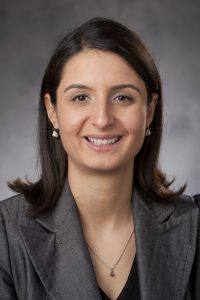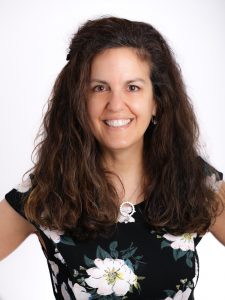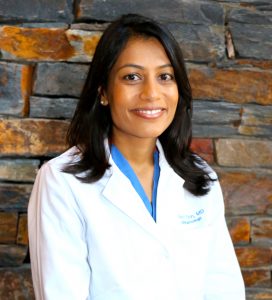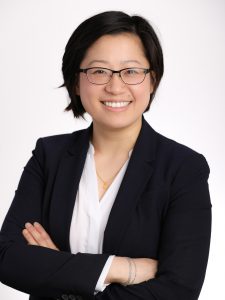#ilooklikeasurgeon coverage was started by the BBC in 2015. A surgeon named Stephanie posted “Why are my male colleagues called “doctor” and I’m called by my first name on a daily basis?” Over the past several years, #ilooklikeasurgeon and #ilooklikeanengineer have started a conversation. RetinaLink launched #ilooklikearetinasurgeon at the sixth annual Vit-Buckle Society in Miami, FL, in March 2018.
RetinaLink is honored to feature the Duke Eye Center faculty, Cynthia Toth, MD, Sharon Fekrat, MD, Lejla Vajzovic, MD, Avni Finn, MD and vitreoretinal fellow, Wenlan “Wendy” Zhang, MD in the latest #ilooklikeretinasurgeon. Drs. Toth, Fekrat, Vajzovic, Finn and Zhang provide their insight below on three questions, why they became a retina specialist, their female mentor(s) who inspired them and lastly, what is most challenging professionally. See their interesting responses below.
RetinaLink (RL): Why did you become a retinal specialist?
Cynthia Toth, MD (CT): I first applied for permission to do a cornea fellowship at the end of my residency, but the Air Force (scholarship) would not allow the time for fellowship.
After serving as a general ophthalmologist for two years on active duty, I realized that for me, retina was the most exciting and challenging area of work. I am thrilled with my choice and it has been a rewarding area of work.
Sharon Fekrat, MD (SF): Vitreoretinal surgery is fun with constant innovation and lots of new toys!
Lejla Vajzovic, MD (LV): I have been fortunate to have most inspiring mentors who are retina specialists – naturally, I steered towards that direction. Likewise – I enjoy the challenge of diagnosis retinal conditions, performing complex surgeries and “playing” with some of the most amazing technology.
Avni Finn, MD (AF): The medical and surgical diseases of the retina are not only some of the most complex and challenging cases that are encountered within ophthalmology, but there is a huge opportunity to make a potentially large impact on a patient’s quality of life through the treatment of retinal diseases. As a clinician, I was fascinated by how many systemic conditions could manifest with retinal disease and how I could impact not only the patient’s vision but also the overall health. As a scientist, the constant innovation within the field of retina – medical treatments, imaging advances, and surgical instrumentation – has kept me captivated by the field.
Wenlan “Wendy” Zhang, MD (WZ): I became a retina specialist because I want to help take care of patients of all ages with vision-threatening diseases. I find the clinical and surgical practice of caring for patients with vitreoretinal disease intellectually stimulating, challenging, and rewarding. The field of retina continues to be advanced with new technologies spanning from diagnostic capabilities to treatment modalities. I am honored to join other retina specialists in bringing these innovations to our patients who suffer from vitreoretinal disease.
RL: Who has been a mentor to you and tell me about a woman who has inspired you?
CT: Robert Machemer was an early mentor and a strong advocate for women in Retina. Alice McPherson has been a role model and inspiration, and Joan Miller, ME Hartnett, Julia Haller, Susanne Binder, Hiroko Terasaki and Emily Chew have been dear colleagues and mentors.
SF: My mom, although not a physician, has been a very supportive, ever-present female presence in my life. She has always been there for me and has such a positive, happy spirit. It is because of her that I am who and where I am today. After 20 years as an academic vitreoretinal surgeon, 22 years raising accomplished children, and 28 years of marriage later, I am forever grateful for my mom.
LV: My aunt is the woman who has inspired me to become a physician – her altruism, care of others and love are endless.

AF: I’ve been really lucky to train with strong women mentors in retina. They have not only inspired me but also pushed me to attain my goals, providing bottomless support along the way. Dr. Joan Miller has been an incredible inspiration and mentor to me throughout my training beginning during my residency. In her career, she not only did she contribute to modern day AMD management through her retinal research, but she has paved the way for many women and men she has supported in academia, research and retina.
Avni Finn, MD
I was lucky to have strong female mentors in my fellowship, Drs. Sharon Fekrat, Cynthia Toth and Lejla Vajzovic. There is no shortage of support, role modeling and awe-inspiring patient care when I am around them. I am inspired by them daily.
WZ: I have had the privilege of training with a number of female vitreoretinal surgery mentors at Duke throughout residency and fellowship including Sharon Fekrat MD FACS, Cynthia Toth MD, Lejla Vajzovic MD, and Xi Chen MD, PhD.
They are the epitome of the well-rounded academician, balancing and exceling at clinical, surgical, and academic pursuits. Their dedication to patient care and clinical education are qualities I strive to bring into my future practice of medicine.
RL: What do you find most challenging professionally?
CT: Balancing the excitement and fun of research, patient care and surgery — choosing between the many opportunities and collaborations and reserving time to play.
SF: Balancing patient care, clinical research, teaching, and administration can be challenging. Perhaps most challenging currently however is clicking random boxes in EPIC while trying to give my patients the one-on-one face time and attention that they deserve.
LV: For me, it has been balancing medicine and motherhood – pursing my career goals while still being able to take off work to chaperone a field trip. It has not been easy and I continue to work on it.
AF: As a surgeon, two challenges are knowing when not to operate and how to deal with your failures. The most important lesson I’ve learned in fellowship is that every surgeon has failures but, the best surgeons know how to expertly manage their complications. At the same time, my mentors have taught me the importance of knowing when not to operate. This can be a very difficult decision and conversation but some of the happiest patients may be those who you decided not to operate on.
WZ: The greatest challenge I find professionally is figuring out how to achieve balance in a way that maximizes academic pursuits, and clinical and surgical learning.
Dr. Sharon Fekrat can be reached via e-mail at sharon.fekrat@duke.edu, Dr. Lejla Vajzovic can be reached at lejla.vajzovic@duke.edu, Dr. Avni Finn can be reached at avnipfinn@gmail.com and Dr. Wenlan Zhang can be reached at wenlan.zhang@duke.edu




